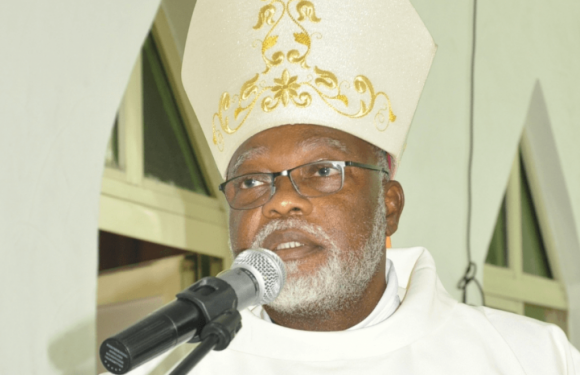A Catholic Bishop who is testifying before US Congress has stated that the killing of Christians in Nigeria’s Middle Best has all the markings of genocide.
Bishop William A. Avenya of the Roman Catholic Diocese of Gboko, in testimony before the Tom Lantos Human Rights Commission said: ‘Our Middle Belt region has truly become a vale of tears, a region where mass burials are very common.’
‘It appears as though what is happening here is part of a grand conspiracy. Our national government has not shown convincing signs of real commitment to ending the menace.’
Bishop Avenya further said that the slaughter of Christians in the Middle Belt, meets the criteria for a calculated genocide according to the definition of the Genocide Convention as ‘acts committed with intent to destroy, in whole or in part, a national, ethnical, racial or religious group.’
Read Also: Christian Genocide: Muslim, Christian Youths Attack UK Lawmakers
‘This has inflicted deep mental, psychological, physical and economic injuries to the affected families and communities,’ Avenya said.
The Tom Lantos Human Rights Commission, co-chaired by Reps. Christopher H. Smith, R-NJ, and James P. McGovern, D-MA, examined the deteriorating human rights situation in Nigeria’s Middle Belt, including its religious dimensions, and proposed responses, in the December 17 hearing, ‘Conflict and Killings in Nigeria’s Middle Belt.’
The Commission on its part said that the underlying causes of the conflict in Nigeria’s Middle Belt are complex and varied, which includes competition for access to land and other resources between pastoralists and farmers, exacerbated by drought, desertification, and climate change. In a part of the country where farmers are mainly Christian and pastoralists are mainly Muslim and ethnic Fulani, deadly confrontations have sharpened ethnic, regional and religious polarization.
Precise statistics are unavailable and fatality counts are contested, but one analysis estimated that farmer-pastoralist conflicts killed 2,000 Nigerians annually between 2011 and 2016. Some have described attacks by pastoralists as a persecution of Christians, amounting to an attempted or unfolding genocide. Some Muslim leaders, for their part, have described attacks on Fulani as part of an effort to purge Nigeria’s Muslim community.
The Nigerian state has failed to provide protection or ensure accountability for any of the victims.’
The commission pointed out that earlier this month, for the first time, the U.S. State Department designated Nigeria as a Country of Particular Concern for violations of religious freedom, opening the country up to possible economic sanctions.
It is also stated that others testifying at the hearing were U.S. State Department officials and human rights organisations.
‘The largest, dominant driver of conflict in the Middle Belt region is committed by Fulani extremists, who appear driven in large part by ethno-religious chauvinism, against mostly Christian farmers – though I do note that elsewhere Shia Muslims are also victims, and that intra-Sunni conflicts also exist within the Muslim community as well,’ said Smith.
‘The United States and the international community must do more to mitigate the violence because the dire situation on the ground warrants it and because the people of Nigeria deserve to live in peace and freedom with their fundamental human rights guaranteed and because Nigeria is the largest country in Africa and what happens there has an outsized impact in West Africa and in Africa as a whole.’
‘Since the consistent attacks began some five years ago, there has hardly been a single day gone without killing in one part of the region or the other,’ Bishop Avenya told the hearing.
While some observers have shied away from painting the conflict as Muslim-on-Christian violence, Avenya noted that the Fulani are largely Muslim, and that there is a ‘high probability that the killings have a religious undertone.’
However, he lamented that ‘no one has ever been arrested or questioned or prosecuted or convicted of any charge relating to this spree of killings.’
‘Yet, these killers are not invisible, neither are they unknown. Instead, these atrocities are made to look as though they were ethnic or communal clashes.’
AFRICA DAILY NEWS, NEW YORK










